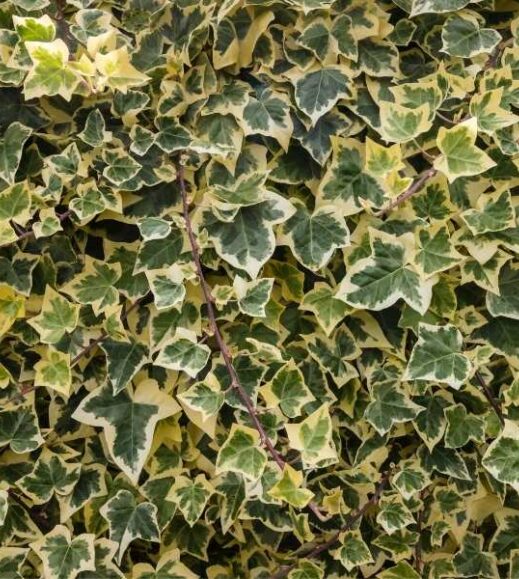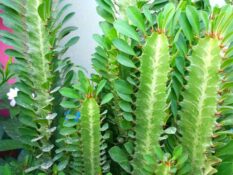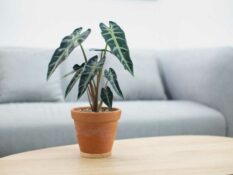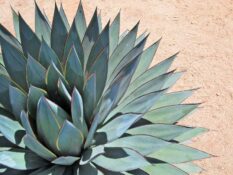Propagate | Soil | Light | Water | Temperature | Humidity | Potting | Pruning | Fertilize | Pest Control | FAQs
Algerian ivy, also known as Canary Island Ivy or Hedera canariensis, is a luscious evergreen climbing vine native to the western Mediterranean region. Grown mainly for its large leathery leaves that range in color from light green to dark green and white variegated, Algerian ivy grows quickly and can reach heights of up to 30 feet. Its clusters of tiny yellow-green flowers and small black berries are also quite attractive. With its ease of care, Algerian ivy is an ideal plant for gardeners who want a fast-growing evergreen that adds texture to walls, fences, or trellises.
Algerian ivy plants need plenty of sunlight but will also tolerate part of the shade. They thrive in moist soil rich in organic matter and should be watered regularly, so the soil doesn't dry out completely. Algerian ivy can grow vigorously and must be pruned back occasionally to prevent it from taking over your garden or climbing too high. This guide will find all the information you need to grow and care for Algerian ivy plants successfully. With the right tips and tricks, your Algerian ivy will thrive in your outdoor space for years to come.
Do Algerian ivy flower? What color is the Algerian ivy flower?
Yes, Algerian ivy produces small clusters of yellow-green flowers in the late summer and early fall. The flowers are fragrant and attract pollinators such as bees and butterflies to your garden. They are followed by small black berries that mature in the winter months. Pruning of the flowering stems will encourage more vigorous growth.
When to plant Algerian ivy plant?
Algerian ivy is best planted in early spring when the soil is still cool. This allows it to settle in and become established before the summer heat arrives. Algerian ivy can also be planted in the fall, as long as you take care to water it regularly until temperatures drop and rainfall increases. Plant your Algerian ivy in a spot that gets plenty of sunlight and is sheltered from strong winds.
Types of Algerian ivy: what are the recommended varieties of Algerian ivy plants?
There are several varieties of Algerian ivy plants, each with unique characteristics. The most common varieties are:
- "Canary Cream" boasts green leaves with deliciously creamy white margins, making it a unique and attractive choice for any garden or landscape.
- 'Gloire de Marengo' or 'Variegata', is quite the eye-catching plant! With its deep green leaves edged in white and stunning silvery green patches, this beauty can grow up to 6 inches long. Despite its beautiful foliage, it is slightly sensitive to frost - so ensure you keep an eye on temperatures when caring for your Gloire de Marengo.
Algerian ivy soil requirements: What is the best soil for Algerian ivy plants?
Algerian ivy plants require a well-drained soil that is rich in organic matter. A potting mix or garden soil mixed with peat moss or compost is ideal for maximum growth potential. Test the pH level of your soil and make sure it's between 6.5 and 7.0. Algerian ivy prefers soils with a slightly acidic pH level, so if necessary, add sulfur to lower the pH.
Adding amendments and enhancers can also help boost the growth and health of your Algerian ivy plants. Fertilizer should be added at least once a year in the spring, and compost or peat moss should be added to the soil at least twice a year. Adding manure, bone meal, or other organic matter will also help to keep your Algerian ivy plants healthy and to thrive.
Algerian ivy light requirements: How much light does Algerian ivy plant need?
Algerian ivy plants need a minimum of four hours of direct sunlight daily but can also tolerate part shade. If you are growing your Algerian ivy in a container, ensure it is placed in an area that receives at least four hours of direct sunlight. Protecting your Algerian ivy plants from the wind and cold winter temperatures is important if you live in a colder climate. Remember that too much direct sunlight can scorch the leaves of your Algerian ivy plants.
Plant grow light can also supplement natural sunlight for Algerian ivy plants, especially in the winter. Plant grow lights are full spectrum lights designed to mimic
Algerian ivy water requirements: How often to water the Algerian ivy plant?
Algerian ivy plants should be watered regularly during the growing season. Depending on your local climate, this could mean watering once a week or every two weeks. During the winter, Algerian ivy plants need less water and can go a month or two without being watered. As always, monitor the soil moisture levels and water when necessary. Over-watering can lead to root rot and other diseases, so be mindful of how much water your plants are getting.
When transplanting Algerian ivy, give it plenty of water to help it settle in and become established. Water your newly planted Algerian ivy every other day for the first two weeks, then reduce watering to once a week. During extreme temperatures, such as heat waves or cold spells, water your Algerian ivy more frequently to help it survive the weather.
An irrigation system can also ensure that your Algerian ivy plants stay consistently watered, especially during the hotter months. An irrigation system can also help save time and water, as you don't have to water your plants manually.
Algerian ivy temperature range: What temperature can Algerian ivy tolerate?
Algerian ivy is hardy in USDA zones 6 – 11, meaning it can survive temperatures between 0°F and 100°F. Algerian ivy can be grown indoors in containers or as a houseplant in colder climates. Keep your Algerian ivy plants in a cool, shaded area during summer to prevent wilting and to burn from the hot sun. In the winter months, keep your Algerian ivy plants in an area with temperatures between 50°F and 65°F.
If you live in a warm climate, it's important to ensure your Algerian ivy plants are in a location with plenty of air circulation. If the temperature is too high, it can cause the leaves of your Algerian ivy plants to turn yellow and become dry and brittle.
You can use a greenhouse, cold frame, and protective plant covers to protect plants during bad weather. It is better to use a greenhouse, cold frame, and plant protective covers to insulate your Algerian ivy plants from extreme temperatures, wind, and frost.
Algerian ivy humidity: Do Algerian ivy like humidity?
Algerian ivy plants prefer humidity levels between 50% and 70% but can survive in slightly higher or lower levels. In dry climates, it's important to mist your Algerian ivy plants regularly or use a humidifier to keep humidity levels up. You can also use a pebble tray or misting bottle to give your Algerian ivy extra moisture.
In very humid climates, it's important to provide your Algerian ivy plants with plenty of airflow circulation to prevent fungal diseases. Placing your Algerian ivy plants in a spot with good airflow, such as near an open window or fan, can help keep the humidity levels down.
To maintain the humidity of plants, you can also consider investing in a humidifier. A few drops of essential oil or some crushed ice can also help increase the moisture levels around your Algerian ivy plants.
Algerian ivy plant propagation: How to propagate Algerian ivy plant?
Several methods of propagating plants include propagating plants, including stem cuttings, air layering, and division.
Propagating Algerian ivy plant by cutting
Algerian ivy plants can be propagated by stem cuttings. To do this:
- Take a 4-6 inch cutting from the tip of a healthy stem and remove the lower leaves.
- Dip the cut end of the stem in a rooting hormone, then place it in a pot filled with moistened soil or perlite.
- Cover the pot with a plastic bag or glass jar and place it in an area with indirect sunlight.
In 4-6 weeks, the stem cutting should have taken root and will be ready to be transplanted into a larger pot.
Propagating Algerian ivy plant by air layering
Air layering is another effective way to propagate Algerian ivy plants. To do this, select a healthy stem and remove the lower leaves. Please make a small cut in the stem, then wrap it in moist sphagnum moss and tie it up with string or twine. Cover the moss with plastic wrap to keep it moist. Roots will start forming at the stem's cut site in a few weeks. Once the roots have developed, you can cut off the stem and transplant it into a larger pot.
Propagating Algerian ivy plant by division
Algerian ivy plants can also be propagated by division. To do this:
- Select a healthy plant and carefully remove it from the pot.
- Gently separate the clump into two or three sections, ensuring each has a healthy root system.
- Plant the divisions in separate pots and keep them moist until they become established.
Regardless of your chosen method, it's important to remember that Algerian ivy plants are sensitive and do not tolerate temperatures below 50°F. Therefore, it is important to keep your newly propagated plants in a warm, well-ventilated area until they become established.
Potting Algerian ivy plant
Algerian ivy plants should be repotted every two years to ensure fresh and nutrient-rich soil. When re-potting, make sure you use a pot slightly larger than the previous one and fill it with a light, well-draining potting mix. Initially, you can use a potting soil mix high in organic material, such as peat moss or compost. You are adding perlite or sand to the soil mix as the plant grows for extra drainage.
Selecting the correct pot size or container for the Algerian ivy plants is important to select the correct pot size or container for the Algerian ivy plants. A pot that is too small can cause root rot, and a pot that is too big may result in over-watering. For optimal growth, Algerian ivy plants generally prefer a pot about 6 inches deep and 8 inches in diameter.
How to prune Algerian ivy plant?
Pruning is an important part of caring for Algerian ivy plants. Pruning will help keep the plant looking its best and encourage new growth. To prune your Algerian ivy plant:
- Remove any dead or damaged leaves.
- Use a pair of sharp scissors or garden shears to snip off any stems that are growing too long or out of shape.
- Make clean, angled cuts just above a node (where the leaves join the stem).
How to fertilize Algerian ivy plant?
Algerian ivy plants are fast-growing and require regular fertilization. You can use a balanced liquid fertilizer or a slow-release fertilizer for the best results. If using a liquid fertilizer, feed the plant every two weeks throughout the growing season and once a month in winter. If using a slow-release fertilizer, apply it once every three months during the growing season and once in winter. Make sure to follow the instructions on the label carefully.
Choose a high-quality fertilizer with a balanced NPK (nitrogen, phosphorus, and potassium) ratio to fertilize Algerian ivy. Some of the plants also benefit by adding appropriate soil amendments.
Common Algerian ivy diseases and how to manage Algerian ivy disease?
Algerian ivy plant is prone to a few common pests and diseases, including:
Root rot: Root rot is caused by a fungus attacking the plant's roots. Symptoms include yellowing leaves and wilting stems. To prevent this disease:
- Use well-draining soil and avoid over-watering.
- Remove the plant from the pot and prune away the affected roots if the plant is affected.
- Repot the plant in fresh, sterile soil to help prevent further infection.
Powdery mildew: This fungal disease is characterized by a white, powdery coating on the leaves and stems of the plant. To prevent this disease, make sure to provide adequate air circulation. If the plant is affected, spray it with a fungicidal or horticultural oil solution and discard any severely infected areas of the plant.
Spider mites: These tiny, spider-like pests feed on the plant's leaves and can cause yellowing and wilting of the leaves. To prevent spider mites, keep the plant in a cool, dry area and spray it with an insecticidal soap solution.
In case of an outbreak, Use good quality insecticides and fungicides to manage these diseases. Carefully follow the instructions on the label to ensure that you are using the product correctly and safely.
Ten reasons to grow Algerian Ivy
1. Versatile and Attractive: Algerian ivy plants are versatile and attractive. They can be used as ground cover, hanging baskets, or containers.
2. Easy to Care: Algerian ivy is a low-maintenance plant and easy to care for. It requires minimal pruning and little watering once established.
3. Fast Growing: Algerian ivy plants grow quickly and provide an instant splash of color to any garden or landscape.
4. Adaptable to Different Conditions: Algerian ivy can withstand a wide range of growing conditions, from full sun to partial shade and from moist soil to dry conditions.
5. Attracts Pollinators: The flowers of Algerian ivy attract bees, butterflies, and other pollinators.
6. Low Maintenance: Algerian ivy is easy to maintain and requires little pruning and fertilizing once established.
7. Evergreen and Colorful: The plant has evergreen foliage that provides an attractive backdrop year-round, with its bright green leaves tinged purple in the wings.
8. Great for Containers: Algerian ivy can be grown in hanging baskets or containers for a splash of color on patios and balconies.
9. Tolerates Shade: Algerian ivy plants tolerate partial shade, making them a great choice for shaded garden areas.
10. Versatile Uses: Algerian ivy can be used as a ground cover, screen, or border plant. It can also be trained to climb a trellis or wall for a dramatic effect.
Explore our plant grow and care guides collection to add more plants to your garden.
Join AgFunnel community of gardener, share a picture of your garden and receive support from fellow plant lovers.
Happy gardening!
FAQs
Where to put Algerian ivy?
Algerian ivy is perfect for an apartment balcony or windowsill garden as it does not require soil or much watering. This plant can also thrive in low-light conditions, making it great for those who don't have access to full sunlight regularly.
How often should Algerian ivy be watered?
Algerian ivy should be watered once or twice a week, depending on the humidity level in your home. Make sure to keep the soil moist but not overly wet to prevent root rot. When in doubt, underwatering is better than overwatering.
How to get Algerian ivy to bloom?
Algerian ivy will bloom with minimal effort once it is established in its new environment. Ensure the plant has adequate light, water, and airflow for optimal blooming. Also, look for potential pests or diseases that could damage your plant. Treat them promptly if observed.
Does Algerian ivy plant like sun or shade?
Algerian ivy can thrive in the sun and shade but prefers bright, indirect light. Avoid placing the plant in direct sunlight, as it can scorch the leaves. If you don't have access to full sunlight, make sure to provide the plant with a bright windowsill with indirect light.
Is the Algerian ivy plant annual or perennial?
Algerian ivy is a perennial plant that blooms for many years if properly cared for. It can be propagated easily, making it easy to share with friends and family. This plant is low-maintenance and requires minimal effort once it is established in its new environment. With proper care and maintenance, you can enjoy the beauty of Algerian ivy for many years to come!
Does the Algerian ivy plant come back every year?
Yes, Algerian ivy is a perennial plant that blooms for many years when properly cared for. This plant can be propagated with ease and can easily be shared with friends and family. With minimal effort and proper care, you can enjoy the beauty of Algerian ivy for many years to come!
Are Algerian ivy plants toxic to cats?
No, Algerian ivy plants are not toxic to cats. Despite this, it is still best to keep cats away from the plant as they may chew on the leaves and cause damage. Make sure to keep your cat away from the plant, or consider placing it in an area that is out of reach. Also, it is important to keep an eye out for potential pests and diseases that could affect your plant and be sure to treat them as soon as possible if you can.
Are Algerian ivy plants toxic to dogs?
No, Algerian ivy plants are not toxic to dogs. However, like cats, it is always best to keep your pet away from the plant as they may chew on the leaves and cause damage. Consider placing the plant in an area out of your pet's reach, and keep an eye out for potential pests and diseases that could affect your plant.
Are Algerian ivy plants toxic to pets?
No, Algerian ivy plants are not toxic to pets. However, keeping your animals away from the plant is still best, as they may chew on the leaves and cause damage. Consider placing the plant in an area out of your pet's reach and watch for potential pests and diseases that could affect your plant. Additionally, be sure to treat any observed pest or disease promptly to ensure the health and longevity of your plant.
How cold can Algerian ivy plants tolerate?
Algerian ivy plants can tolerate temperatures as low as 10 degrees Fahrenheit. As such, keeping the plant in a warm and humid environment is best to prevent any damage. Additionally, consider providing extra insulation during cold winter to ensure the plant does not suffer from frostbite. Keeping the plant indoors during cold weather is also a good idea, as this will help to protect it from extreme temperatures.
How often to water the Algerian ivy plant?
Algerian ivy must be watered at least once a week to stay healthy. During the summer months, it is important to water the plant more frequently as the weather is hotter and dryer. Additionally, checking the soil before you water your plant is important. If the soil is still damp, it is best to wait until it has dried out before you water it again. Also, avoid over-watering your plant, which can lead to root rot.
When to stop watering the Algerian ivy plant?
When the soil of your Algerian ivy plant is consistently dry, it may be time to stop watering for a bit. This will allow the plant to take a break from regular watering while ensuring it gets the water it needs. Additionally, keep an eye on the weather and adjust your watering schedule accordingly. If temperatures are particularly high and the soil is consistently dry, it may be necessary to water your plant more frequently.
When to fertilize Algerian ivy plant?
Fertilizing your Algerian ivy plant should be done every couple of months throughout the growing season. Using an all-purpose fertilizer should give your plant all the nutrients it needs to stay healthy and happy. Additionally, read the fertilizer bag instructions carefully before applying it to ensure you use the right amount. Too much fertilizer can burn the roots and leaves of your plant, so be careful when applying it.
Are Aeonium and Algerian Ivy Plants Suitable for Indoor or Outdoor Growth?
Aeonium and Algerian Ivy are versatile plants, suitable for both indoor and outdoor growth. When it comes to growing Aeonium hens and chicks, providing well-draining soil and ample sunlight is essential. Algerian Ivy, on the other hand, thrives in both shaded and sunny outdoor areas, making it a great choice for gardeners.
Where to buy Algerian ivy plant?
Algerian ivy plants can be purchased from most garden centers or online nurseries. Finding these plants at local plant swap events or farmers' markets is also possible. Before purchasing, inspect the plants for any signs of pests or diseases that could affect their health. Additionally, ask the seller for advice or tips on caring for your Algerian ivy plant once you bring it home. This will help ensure your plant stays healthy and thriving in its new environment.
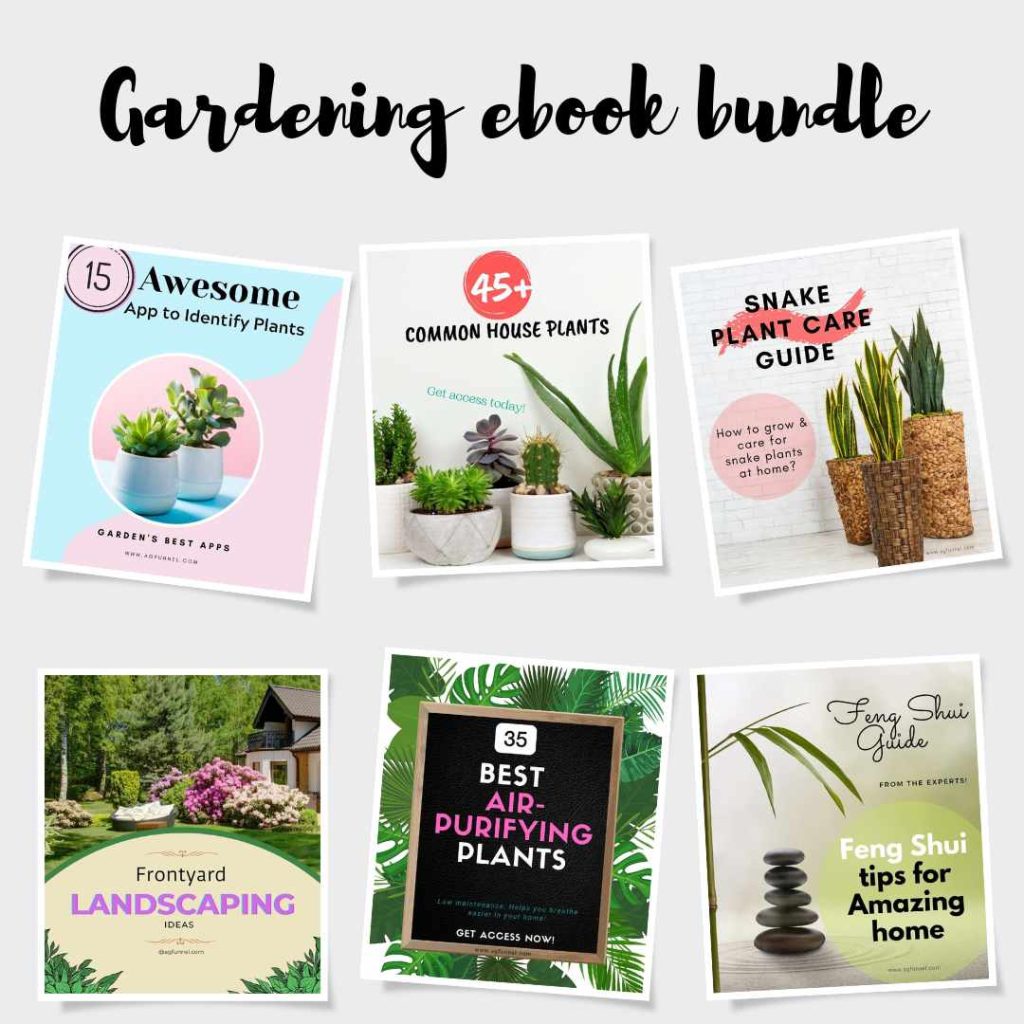
How to master gardening? Download these essential home and gardening ebooks today!

